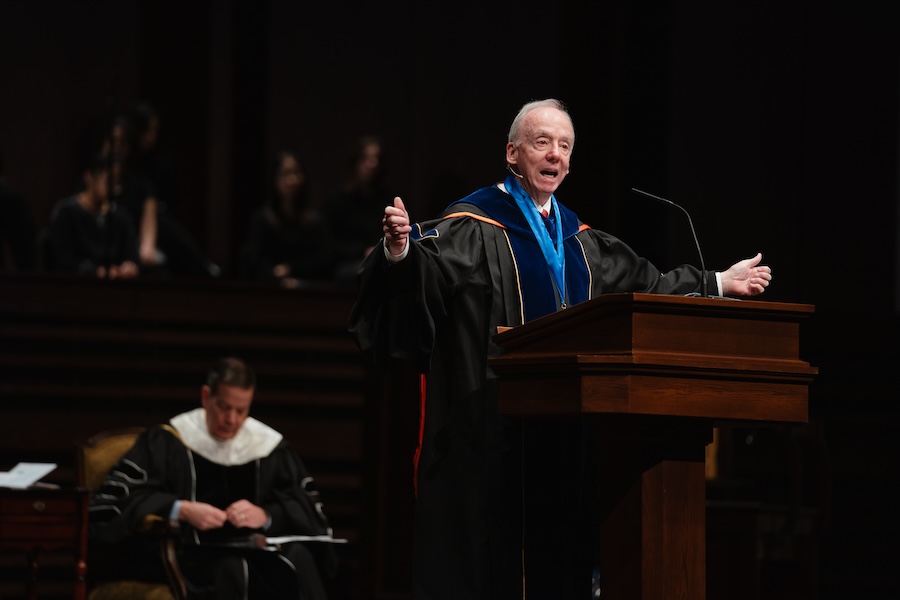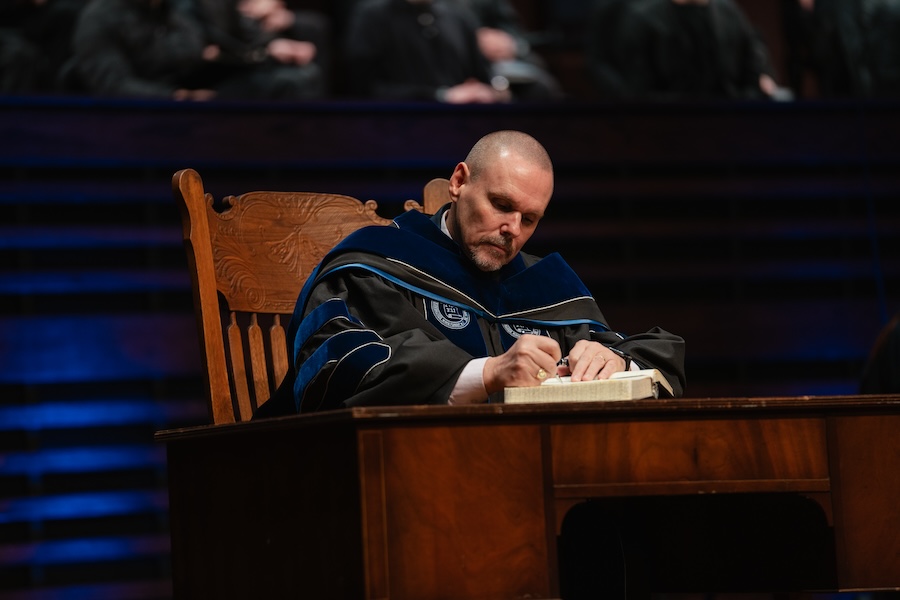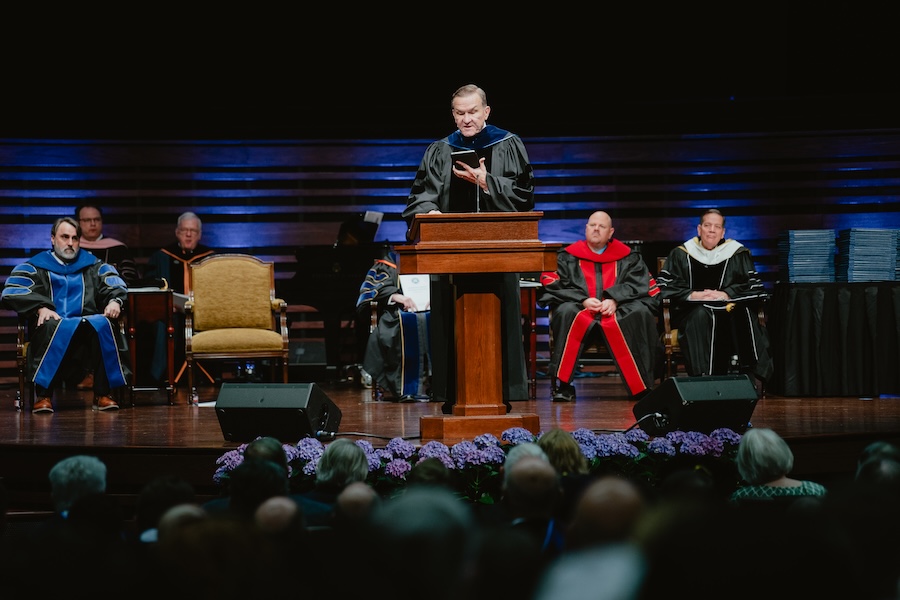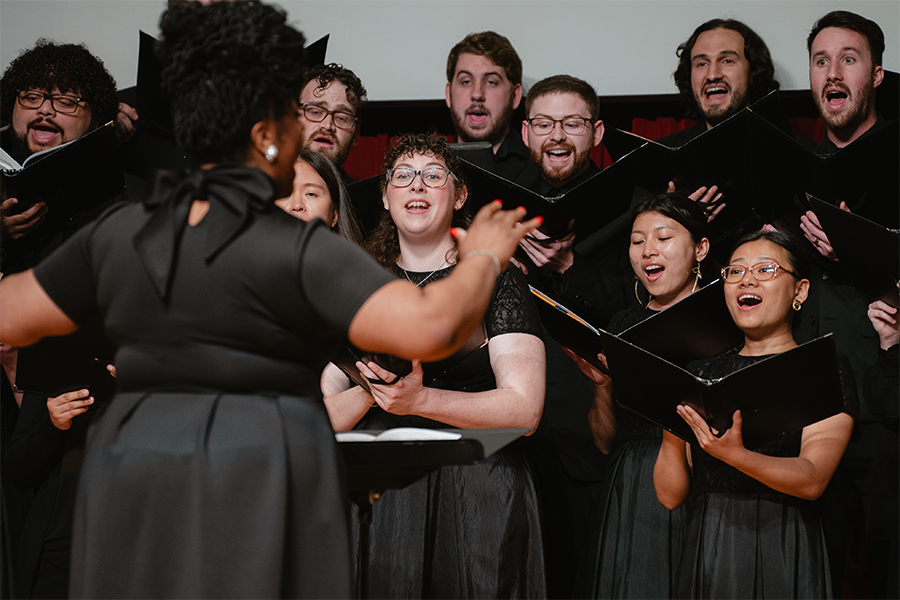Dockery encourages community among Southwesterners in convocation address

During the spring convocation address on Jan. 21, David S. Dockery, president of Southwestern Baptist Theological Seminary, invited Southwesterners to join him in considering what it means to serve and live in community, explaining the importance of the communion of saints and how it impacts the institution.
“In confessing and celebrating our faith as well as our calling to serve at Southwestern, we recognize that we are not alone,” Dockery said of the importance of communion with fellow believers. “That we are a part of something bigger than ourselves, something which brings joy and meaning to our calling, to our service, and to our studies.”
Before the address, the Southwestern community in attendance together read The Apostles’ Creed, the historic confession of faith in the Triune God as well as “the universal church; the communion of saints; the forgiveness of sins; the resurrection of the body; and life everlasting.” Dockery said the statement is an affirmation of faith in Jesus Christ, a confession which he said is “central to the very identity and mission” of the seminary.
“It is this confession that is at the heart of what it means to be a Christ-centered institution,” he said.
Dockery further explained that such confession, specifically that of the communion of the saints, sets a framework for how Southwestern strives to pursue two of its six core values: Christ centered and grace filled, the theme of this spring’s chapel sermon series. This communion is in contrast to a self-centered life in pursuit of worldly pleasure.
“In the place of age-old idolatries of individualism, we gladly on this day reaffirm our commitments to ‘the communion of saints,’ which at its essence points to the basic idea of sharing together,” Dockery explained as a definition for the phrase. “In this learning community, we share together our confessional commitments, our institutional identity, our core values, our insights, our teaching, our exploration and research, our publications and presentations, our times of celebration, our times of joy, our times of sorrow. In fact, we share life together.”
The vision of Southwestern is to equip each student for the work God has for them, and to guide students and faculty alike in their ongoing sanctification, and Dockery said neither of those goals can be achieved in isolation or with an individualistic mindset. Instead, the body of saints, including those found at Southwestern, form a community that crosses social, racial, geographic, and even temporal lines as they strive to walk together in Christ, following traditions set by saints who have gone before.
Evidence of true communion of the saints can be found when a community of believers worships God together, acts with eternity in mind, enjoys life in God together in the unity of the Spirit, while joyfully confessing belief in that communion as a glimpse of the “City of God,” as fifth-century church father Augustine called such a community.
As the Southwestern campus strives for that communion, Dockery noted that it does not do so as a local church, but as a Christ-centered institution seeking “to join with believers around the world in the praise and reverence of the one, true, and living God.”
Dockery pointed out that regardless of title, degree program, or area of study, “Our dream for a grace-filled, Christ-centered community means that we envision a community that represents the people of God who are called to worship and serve together, to study and learn together, to enjoy colleague and friendship together in mutual communion with God.”
The trend of privatization in the contemporary Western culture has led to individuals striving to be autonomous. Dockery said this is also a trend in the academic world as some institutions focus on policies as the only connection between colleagues, instead of genuine relationships. While such policies are important, Dockery said a better model is one where the community has a sense of belonging as they build trust and share life even beyond the campus, all with the goal of glorifying the Lord.
For the faculty, who are both a part of the church and the academic world, Dockery noted they participate in the community with “the recognition that the goal of our work has an end without an end,” an eternal perspective that should bring joy even during difficult times.
“As we look for opportunities to strengthen community at Southwestern, let us do so not only to increase retention, to enhance service to students, as essential as these things are for us at this particular time,” he said. “But we want to do these things with an even higher purpose in mind. We want to create opportunities where we can develop friendships and relationships, ever mindful of the deeper purpose of enjoying the company of others in God, in mutual communion with God.”
While striving for a grace-filled and Christ-centered community at Southwestern, Dockery pointed out that is possible because of the faithfulness of believers who invested in the institution and established the traditions still evident today.
“We are encouraged, strengthened, and heartened in our calling to teach, to learn, to study, to serve in the Southwestern community when we reflect on those faithful believers who have gone before us,” Dockery said.
During the convocation service, Madison Grace, provost and dean of the school of theology, introduced new faculty members including a visiting assistant professor of missions and intercultural studies and Shane Pruitt, instructor of student ministry.

Kevin Rodgers, professor of missions, signed the seminary’s Book of Confessional Heritage, which contains the Baptist Faith and Message, the seminary’s statement of faith.
Kevin Rodgers, professor of missions, signed the seminary’s Book of Confessional Heritage, which contains the Baptist Faith and Message, the seminary’s statement of faith. Faculty formally sign the historic document after election by the board of trustees.
Dockery also welcomed new students to the seminary community, pronouncing them “Southwesterners” in keeping with the tradition begun by Southwestern’s fifth president, Robert E. Naylor.



